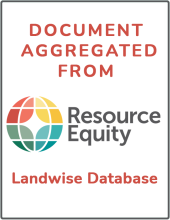Land Library Search
Through our robust search engine, you can search for any item of the over 73,000 highly curated resources in the Land Library.
If you would like to find an overview of what is possible, feel free to peruse the Search Guide.
/ library resources
Showing items 1 through 9 of 319.On 5 March 2021 the Namibian Ministry of Land Reform issued 988 land holder titles to nine associations in Freedom Square;an informal settlement in Gobabis municipality;with an additional 122 to be printed in due course.
A review of a book on land in Kenya published in 2020 by Boydell and Brewer Ltd. The reviewer offers a detailed analysis and discussion of the 8 chapters of this 224-page book.
This article argues that while we know that the demand for land and natural resources has significantly accelerated in the last decade;it remains very difficult to gauge the exact size of the land rush. Many studies that look into how much land is affected give vastly diverging numbers.
Africa’s Catholic bishops have criticized the appropriation of land;natural resources and other economic assets by private companies and called on national governments to show greater concern for local community rights and needs.
Post-Soviet reforms in Kyrgyzstan during the 1990s and early 2000s included the allocation of land for long time use and eventual ownership to residents. 75% of arable land, including over 1 million hectares of agriculture land was distributed during this period.
The findings of this study demonstrate that the despite the bouquet of land laws and other land reforms that have been put in place to make it easier for women to access land rights, both the formal and informal systems remain fraught with multiple extra-legal obstacles in the form of personal (f
The government of Benin in 2013 decided upon a centralized land administration, with the purpose of recording the entire national territory in one land administration system to promote durable economic development by increasing legal certainty in real estate transactions.
Land is a critical factor of production for improving the living conditions of people everywhere.
Cambodia has experienced rapid economic growth due partly to excessive natural resource extraction. Land conflicts have been pervasive between local communities and companies that invest in land and other natural resources.





